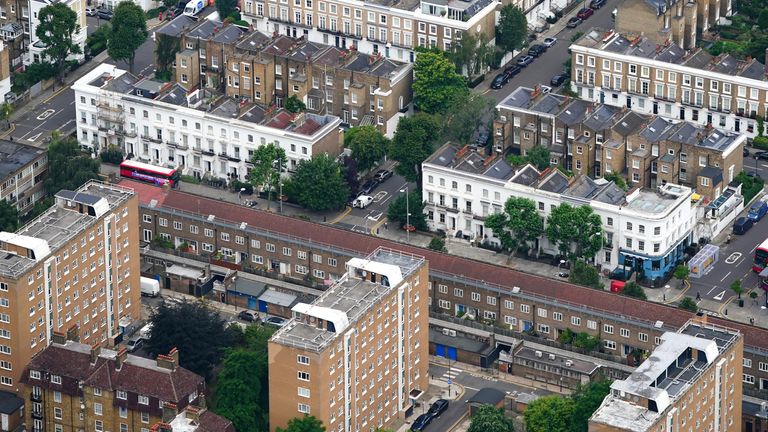Council services such as leisure centres and waste collection could suffer due to the cost of social care if the government goes ahead with plans to scrap district councils in favour of “super councils”, local government sources have claimed.
They told Sky News the government is considering getting rid of district councils, which are responsible for waste collection, housing, leisure centres, local economics and regeneration.
District councils, also called borough or city councils, along with larger county councils would be merged to make “super councils” – or unitary councils – covering an entire region, the sources said.
The changes are expected in the English devolution white paper, set to be published soon, after Chancellor Rachel Reeves said in her October budget she wanted to make council structures “simpler” by reorganising them.
However, there are concerns the rising cost of social care, which larger county and unitary councils have to legally fund, will pull funding away from the basic but essential services district councils provide.
There is also a worry these large councils will become detached from local communities, despite Ms Reeves saying she wanted the reorganisation of council structures “to meet the needs of local people”.
Bridget Smith, Lib Dem leader of South Cambridgeshire district council and vice chair of the District Councils’ Network (DCN), told Sky News: “Unitary and county councils are struggling financially, and in many cases going under, because of the ever-increasing demands of social care.
“It will be no different for these proposed ‘super councils’.
“The danger is social care will suck up all the resources which districts currently spend on place making, economic development, preventing ill health, improving quality of life and so much more.”
She added that simply reorganising local government is “simplistic and naive” and will cause new problems for local communities, and for the government’s housing targets as district councils are responsible for housing.
There is also concern if councils were merged it would take about three years to convert, which would take up all a council’s time, potentially bringing projects to a halt, including house building.
Read more:
Rising cost of social care and school transport to cause blackhole
End Right to Buy, govt urged
Sam Chapman-Allen, chair of the DCN and leader of Breckland district council in Norfolk, said there are examples across England where devolution – handing power and funding from national to local government – is working well, such as Manchester where 10 district councils work together under the mayor of Greater Manchester.
Smaller examples include South Lincolnshire, where three councils work together with a shared senior team.
“I wouldn’t say my members are nervous about change because they’re really nimble, agile organisations, but we want to work with government to get the best outcomes for their residents and businesses,” he told Sky News.
He said district councils also provide lots of preventative “non-traditional” social care schemes off their own backs, such as supporting people to live a healthy life, which means they take pressure off the traditional social care system.
Conservative shadow housing, communities and local government secretary Kevin Hollinrake told Sky News: “Services have to come first so you want to make sure they’re maintained and improve social care, and of course it’s the biggest part of the discretionary budget. It’s a valid concern.
“On the face, there are savings moving from two tier to one tier, but you don’t want the council or councillors to become too removed from what they’re serving.
“The worry here is this is an imposition rather than asking councillors if they want to move to unitary – that’s top down rather than bottom up.
“It’s perverse, you’re talking about devolving then telling councils what to do. It’s a bit of a paradox.”
A spokesman for the ministry of housing, communities and local government said there are “no plans to abolish district councils” and any organisation will be “from the bottom up”.
He added: “No decisions have been taken on council reorganisation.
“Our priority is to focus on the transfer of power from Westminster and work with councils to create structures that make sense for their local areas and work effectively for local people.
“We have announced £1.3bn to help councils deliver essential services – including an additional £233m to help prevent homelessness, and will be providing greater stability with multi-year funding settlements, so we can get councils back on their feet.
“We will set out further details in the upcoming English devolution white paper.”




